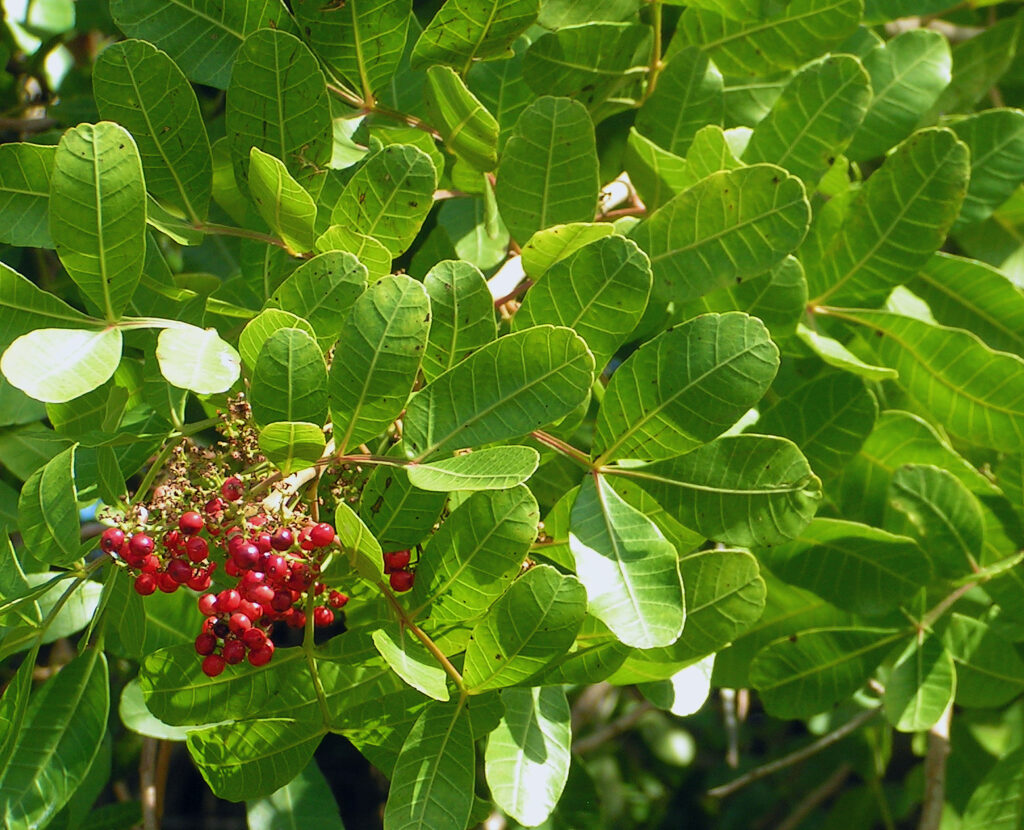Q: I have just read an article about the Brazilian pepper tree and want to know, is it illegal to grow Brazilian pepper? My neighbor has been complaining about one in my yard. Am I legally obligated to cut it down?
Robert
Ft. Lauderdale
Such a loaded question! Brazilian pepper was brought to Florida from South America in the 1840s as an ornamental plant that bears red berries around the winter holidays. It was soon found to spread over much of Florida without help from humans, and it is now considered one of the most aggressive and invasive species in Florida.

Brazilian pepper is classified with poison ivy, cashews, and mangos. Named Schinus terebinthifolius by scientists and horticulturists, its form and fruit make it easy to recognize. Brazilian pepper is an evergreen tree that can reach over 40 feet in height and width. The leaves are compound and look like coarse feathers with elliptical leaflets. The color is medium to dark green, often with a reddish tinge on the midrib. The leaves are arranged alternately on the stems.
Flowers occur in the fall; male and female flowers occur on separate plants. The small, red fruits appear in clusters after the flowers on female plants and ripen from December through March. Fruit production and seed germination are prolific, as is true for most weedy species. Brazilian pepper is spread by seeds and root sprouting.
Brazilian pepper is classified by the State of Florida as a Noxious Weed. This means it is unlawful to introduce, possess, move, or release any part of the plant in Florida. Also, the live plants are not protected by any local or state laws or ordinances.
Ordinances or rules requiring the removal of Brazilian pepper trees vary by municipality. Many entities such as counties, cities, or villages do not have requirements to remove them from private property unless the property undergoes development and a permit of any type is required. Commercial use properties may have different rules. Broward County and the counties of the Treasure Coast all seem to require the removal of invasive species if a development permit is issued for a property.
It is clearly prohibited to possess or transport Schinus terebinthifolius in Florida. Does that make it illegal to grow one in your garden? I think an attorney well-versed in rules and ordinances may be needed to issue an opinion based on municipality. Also, a call to the local zoning or planning department will confirm such requirements.
However, growing an invasive Brazilian pepper plant that degrades public and private assets and health is undoubtedly unethical, wrong, and not in the public interest. Native lands and habitats are damaged by such invading species. Neighboring properties near and far are changed by the multitude of sprouts and seedlings that others must pay to remove in either sweat or dollars. Also, folks may be allergic to Brazilian pepper; when in bloom, respiratory problems and dermatitis are common with contact with these plants, the sap, or pollen.
Is it illegal to grow Brazilian pepper? Be a good neighbor and remove any Brazilian pepper on your property promptly.
Leave a Reply